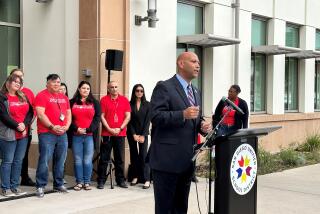Colorado Reinstates Barnett, Keeps AD
After promising “sweeping” reforms and vowing to change the culture of athletics at her school, University of Colorado President Elizabeth Hoffman on Thursday officially reinstated football Coach Gary Barnett.
Barnett had been on paid administrative leave since Feb. 18 as the school investigated a series of sexual assault claims against Colorado football players and recruits.
Hoffman said that although Barnett has shortcomings, “he is a tough disciplinarian, developer of behavioral guidelines and a man who believes a coach’s job is to prepare men and women for their life ahead, not simply excel in athletics.”
Hoffman also announced Athletic Director Richard Tharp would keep his job, although his authority would be curtailed.
Last week, an independent panel concluded in a 51-page report that the school used sex and alcohol to lure recruits to campus but that no one in the administration “knowingly sanctioned” the practice.
Hoffman put Barnett on leave after the coach made critical public comments about former Colorado kicker Katie Hnida, who said she was raped by a Colorado player.
Barnett said, among other things, that Hnida was a “terrible” player. He also said he would back a player accused of assaulting a 19-year-old athletic department employee if it came down to a “he-said, she-said” story.
“Did Coach Barnett say things that I and others have found offensive?” Hoffman said at a news conference in Boulder. “The answer is yes. And for that he has paid a price.”
Hoffman said Barnett, Tharp and Chancellor Richard Byyny deserved the chance to help implement changes the school was unveiling.
“I find the suggestion that CU’s athletic department and the people who oversee it, that they fostered a climate that condones rape and sexual abuse to be utterly contrary to the facts as I know them,” Hoffman said.
Barnett could not be reached for comment. The number for his cell phone was no longer in service.
He issued a statement through his public relations agency saying, in part, he was “grateful to the CU community, parents, players, students, fans and alumni for their loyalty and support during my administrative leave.”
Barnett, hired as Colorado coach in 1999, said that he looked forward to being a productive member of the CU community for years to come and that he was “dedicated to leading a socially responsible program that will be a source of pride to CU, athletically and academically.”
The Colorado football scandal became national news in January, when deposition testimony was made public in which Boulder Dist. Atty. Mary Keenan said she believed Colorado was using sex and alcohol to lure football recruits to campus.
Three women have filed Title IX civil lawsuits against the school, saying they were sexually assaulted by Colorado recruits at an off-campus party in December 2001.
Title IX laws prohibit sex discrimination from schools that receive federal funds.
At least nine women have said they were sexually assaulted by Colorado players or recruits since 1997, although criminal charges have not been filed.
Joanne Belknap, a CU sociology professor who has called for Barnett’s firing, said she was outraged by Hoffman’s decision.
“I’m not surprised, but I’m devastated,” Belknap said in a telephone interview from Boulder. “I feel like this has been framed the whole way along and this was going to be the end result.”
Belknap thought Barnett, Byyny and Tharp all deserved to lose their jobs in the wake of the scandal.
Belknap said Hoffman’s decision was “a huge step backward for rape victims, for anyone who believes in accountability and social justice. It’s sad and enraging.”
Belknap said Hoffman showed “a huge lack of leadership” in not firing Barnett or any other administrator.
“This feels like a slap in the face,” she said, “although it was a slap I was expecting.”
In a statement, NCAA President Myles Brand said the Colorado scandal was a “symptom of a more serious malady, the lack of integration of intercollegiate athletics into the mainstream of a university.”
In prefacing her decision to keep Barnett, Hoffman outlined a series of reforms she says will change the culture of athletics at her school.
Hoffman said the athletic department would be integrated into the academic departments.
“To the degree that a good old boy’s club still exists within the athletic department, those days are over,” Hoffman said.
Tharp will report directly to the school’s provost, instead of the chancellor. The provost is the university’s chief academic officer.
The Vice Chancellor for Student Affairs will be in charge of helping athletics integrate into campus life.
The independent commission was critical of Tharp for not implementing recruiting changes insisted upon by the chancellor’s office.
Hoffman acknowledged Tharp made mistakes.
“Were his shortcomings so egregious that they should result in his immediate dismissal?” she asked. “I think not.”
Hoffman said at her news conference that she empathized with victims of sexual violence.
“I want to state categorically: Violence against women is abhorrent to the values of this university, period,” Hoffman said.
The school announced two task forces would be formed related to violence against women.
In March, Colorado drastically revamped its recruiting procedures.
The policy restricts visits during the football season, limits campus visits to one night instead of two and eliminates the use of football players as “hosts.”
“We are taking action and we will be accountable,” Hoffman promised.
She said the new policies were “landmark changes, transformative changes in the way we operate.”
More to Read
Go beyond the scoreboard
Get the latest on L.A.'s teams in the daily Sports Report newsletter.
You may occasionally receive promotional content from the Los Angeles Times.











